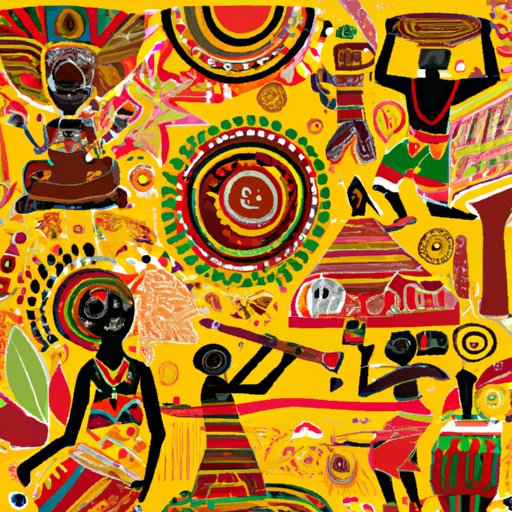Introduction
African culture is a rich and diverse culture that is rooted in centuries of tradition and belief. From traditional customs to religious rituals, the continent of Africa has a unique and varied cultural heritage. In this article, we will explore the various aspects of African culture, from its traditional customs and beliefs to its artistic expression and spiritual connection with ancestors. We will also examine the influence of colonialism and religion on African culture.

Exploring the Traditions and Beliefs of African Culture
Africa is home to many diverse cultures and traditions. Traditional customs, such as polygamy, are still practiced in some parts of the continent. Beliefs in supernatural forces, such as spirits and deities, are also common in many African societies. Divination practices, such as divining the future or predicting events, are also widely used by traditional healers and shamans.
For example, in Ethiopia, the ancient practice of “bultuma” is used to predict the future. This practice involves throwing stones on the ground and interpreting the pattern they form. Similarly, in Nigeria, traditional healers use “Ifa” divination to communicate with the spirit world and seek guidance.
The Artistic Expression of African Culture
African art is an important part of the continent’s cultural heritage. Visual arts, such as painting, sculpture and pottery, have been used for centuries to express ideas, stories and beliefs. Music is also a major part of African culture, with different styles and instruments being used to create unique sounds. Dance is a popular form of artistic expression, with different tribes using their own movements and rhythms to tell stories and celebrate special occasions.
For instance, in South Africa, the Zulu people use dance to express their history and culture. Their dances are characterized by vigorous body movements and stamping of feet. Similarly, in Ghana, the Ewe people use drumming and dancing to honor their ancestors and celebrate special occasions.
Celebrating African Music, Dance and Festivals
Music and dance are an integral part of African culture. Celebrations of life cycles, such as weddings and funerals, often involve traditional music and dance. Music and dance are also used to mark seasonal changes and festivals. Popular festivals, such as the West African Gelede festival, are celebrated with music, dance, and storytelling.
In Kenya, traditional music and dance are used to celebrate the harvest. The Masai tribe performs a traditional dance called the Adumu, where dancers leap into the air in perfect synchronization. Similarly, in Zimbabwe, the Shona people perform a traditional dance called the Jerusarema. This dance tells the story of a brave warrior who fought off an enemy attack.
Examining the Role of Ancestors in African Culture
Ancestors play an important role in African culture. Ancestors are believed to be powerful spiritual guides who can provide protection and guidance to those who revere them. Practices for honoring ancestors range from ritual offerings to memorial ceremonies. Many African cultures also believe in keeping a spiritual connection with their ancestors through prayer and meditation.
In Uganda, the Baganda people have a strong reverence for their ancestors. They believe that the spirits of their ancestors can protect them from harm. As a result, they make regular offerings to their ancestors and hold memorial ceremonies in honor of their deceased relatives. Similarly, in South Africa, the Xhosa people believe that their ancestors can guide them through life and give them strength in times of need.

Investigating the Impact of Colonialism on African Culture
Colonialism had a significant impact on African culture. During the period of colonial rule, there was a significant exchange of cultural influences between the colonizers and the colonized. This exchange led to the disruption of traditional norms and values, as well as the introduction of new forms of cultural expression. The legacy of colonialism still has an effect on African culture today, with many aspects of the continent’s cultural heritage having been influenced by colonial rule.
For example, in Kenya, the British introduced Christianity, which became the dominant religion in the country. Similarly, in South Africa, the Dutch introduced the Afrikaans language, which is now one of the official languages of the country. In addition, many aspects of traditional African art, such as sculpture and pottery, have been influenced by European art styles.

Analyzing the Influence of Religion on African Culture
Religion plays an important role in African culture. Religious diversity is a defining feature of the continent, with Christianity, Islam, and traditional African religions coexisting side by side. Each religion has its own beliefs and rituals, which are practiced by adherents. Islam, in particular, has had a significant impact on African culture, particularly in North and West Africa.
For instance, in Nigeria, the majority of the population is Muslim, and Islamic beliefs and practices are deeply embedded in the culture. Similarly, in Senegal, the majority of the population is Muslim and Islamic values and traditions are an important part of daily life. In both countries, Islamic festivals and holidays are widely celebrated and mosques are a common sight.
Conclusion
African culture is a rich and diverse tapestry of traditions, beliefs, artistic expression, and spiritual connections. From traditional customs and beliefs to the influence of colonialism and religion, African culture has been shaped by centuries of history and continues to evolve today. Whether it’s celebrating life cycles with music and dance, honoring ancestors with ritual offerings, or exploring the spiritual realm with divination practices, African culture is an important part of the continent’s heritage.
In conclusion, African culture is a vibrant and ever-evolving culture that is steeped in tradition and belief. From traditional customs to religious rituals, the continent of Africa has a unique and varied cultural heritage that is worth exploring and celebrating.
(Note: Is this article not meeting your expectations? Do you have knowledge or insights to share? Unlock new opportunities and expand your reach by joining our authors team. Click Registration to join us and share your expertise with our readers.)
